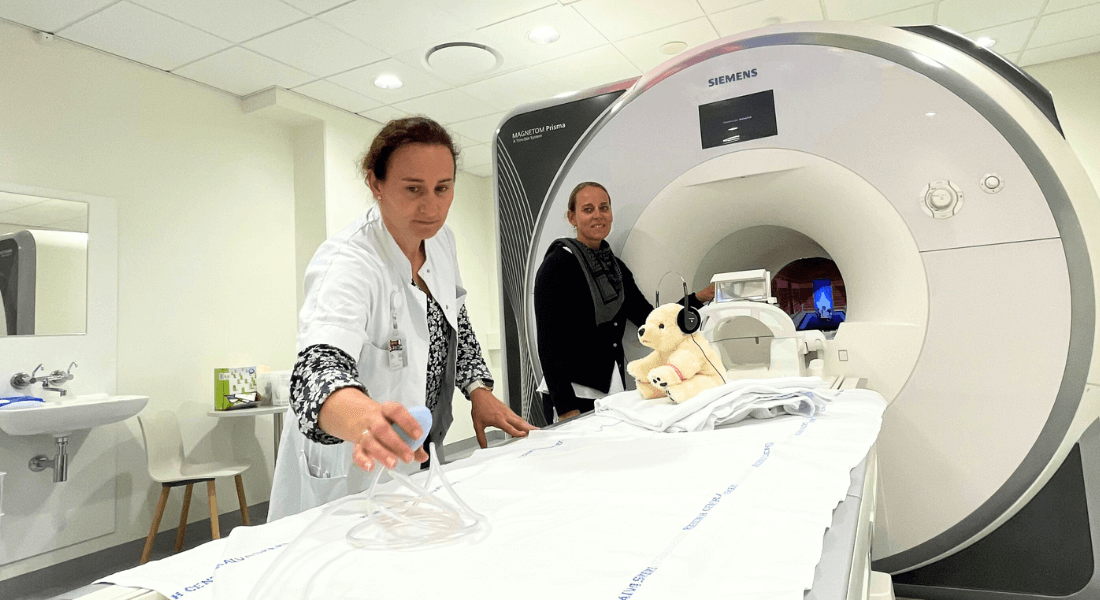Apps, cartoons and training reduces need to anesthetise kids
Children about to undergo medical imaging procedures are usually put to sleep with anaesthetics so they won’t move in the scanner. This is not ideal. Anaesthetics can have side effects and patients need constant and labour-intensive monitoring. Now, a joint research project by Innovation District Copenhagen partners University of Copenhagen and University hospital Rigshospitalet shows how to reduce the need for anesthetising scanned children by 94 percent.

News story produced by Innovation District Copenhagen
Melanie Ganz is a computer scientist specializing in medical image processing at the University of Copenhagen, Department of Computer Science (DIKU), and is one of four researchers shared between hospital and university. She had learned of a motion tracker that can function in the strong magnetic field given off by MR scanners and she very much wanted to test it.
"The motion tracker was really cool hardware, but it was not being used in clinical work. I started looking for problems that it might solve, and discovered how children are routinely put to sleep before going into an MR-scanner. I felt that the tracker could play a vital role in a research project designed to discover how we can get kids to lie still in the scanner without sedating them”: Melanie Ganz, Associate Professor, University of Copenhagen and Rigshospitalet.
Every parent knows about the challenges of getting children to lie still. Multiply the standard problems by a large and unfamiliar machine producing terrifying noises, and you start to understand the difficulties facing MR scanner personnel. To understand the problem fully, Ganz enrolled an anaesthetics nurse.
“When I met Melanie, her project appealed immediately. I felt it would be fantastic to avoid sedatives for children. Every time we anaesthetise a child for a scanning, we need a doctor, a nurse and a whole recovery ward. We can never hope to scan more than three to four children in a day. Surely, there must be ways to avoid anesthetizing children for MRI ”: Thurid Waagstein Madsen, Anaesthetic Research Nurse, Neurobiological Research Unit, Rigshospitalet.
High success rate
Ganz designed a many-layered procedure to solve the problem based on the existing literature in the field. Children start at home by logging on to a newly designed app, where short films show the experience of teddy bears Theo or Thea in the scanner. After viewing the films, children are invited to share the bears’ experience in a specially built and highly realistic mock-scanner at Rigshospitalet.
Here, they practice lying still in the claustrophobic confines of the scanner, while watching cartoons to distract them from the loud noises of the machine. All the while being motion-tracked to see if they really are as motionless as needed. After a training session in the mock-scanner the children are then invited to repeat the procedure in a real scan session. The approach has been a resounding success. Of the 50 children invited, 47 went on to be scanned without drugs – a success rate of 94%.
The results are presented in the end of September 2024 at the annual conference of the society for developmental cognitive neuroscience, FLUX, as well as the fetal, infant and toddler neuroimaging group conference, FITNG, and will also be published afterwards.
“It is better for the children as well as their parents, if we avoid full Anaesthesia, and it’s wonderful when projects like these open our eyes to new solutions. Having researchers active in our clinics as well as with our Innovation District Copenhagen-partner Department University of Copenhagen has proven time and again to contribute to this development. In the longer run, we hope that these results will allow us to increase the number of daily scannings from three or four to eight or nine” Malene Fischer, Chief Research Officer, Rigshospitalet.
Collaboration leads to new solutions
For Ganz and Madsen, the next step is to uncover whether all the elements need to be in place to be useful. Perhaps the kids will end up only needing to watch cartoons in the real scanner. This may not sound very “computer science-y”, but to get there Ganz had to set up and test software for scanner and tracker and validate it in healthy adults before even getting permission to test it on paediatric patients in the clinic. The team also had to develop the mobile phone app for preparation as well as design and build the mock scanner. All with the goal to test and develop a whole new workflow for the clinic.
“It is very gratifying to see a joint research project with Rigshospitalet come to such a rewarding conclusion. We created the joint positions with the hospital because healthcare is a sector where computer science can create great impact and Rigshospitalet is not only our Copenhagen Science City-partner. They are also located just across the street from us”: Jacob Grue Simonsen, Head of Department, Dept. of Computer Science, University of Copenhagen.
For future collaborations between DIKU and Rigshospitalet, Melanie Ganz has a few pieces of advice. She would urge computer scientists to seek admission to actual clinics to observe what the clinicians need. For hospitals thinking about collaborations with tech-specialists, she recommends an investment of time.
“Handing out reams of data is not enough. Not even if your collaborator is a computer scientist. Invite them into the clinic. Take the time to explain your pain-points. Build a long-term engagement by taking on a joint student. The more knowledge sharing happens between collaborators, the better chances of a great result”: Melanie Ganz, Associate Professor, University of Copenhagen and Rigshospitalet.
The project was funded by the Elsass Foundation.
Contact
Melanie Ganz-Benjaminsen
Associate Professor
Department of Computer Science, University of Copenhagen
ganz@di.ku.dk
